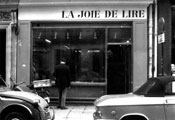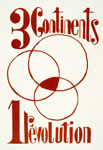The life of François Maspero, born in 1932, is deeply rooted in the ‘dark years’ of the Occupation.
His family were to pay dearly his engagement in the Resistance. His father, sinologist, Professor at the Collège de France, died in a camp. His mother survived internment in Ravensbrück. His brother, chief of a Communist network, was killed in combat.
After his studies, François Maspero bought a bookshop in the Latin Quarter in 1956, La Joie de lire.
This lively, pluralistic commerce, where lots of events were organised, became a pivotal point for the diffusion of left-wing political and social ideas but also of creation.
In June 1959, Maspero and his team published their first book, La Guerre d’Espagne by Pierre Nenni. We can agree with the historian Julien Hage when he says, ‘François Maspero belongs to a lineage of great bookseller-publishers (…), a classic figure in French publishing’. He adds a rare militant contribution.
‘I consider that my only crime is to have done my job, my job as a publisher conscientiously and right to the end. […].
All those who think that the ignoble sight of hundreds of millions of human beings dying of hunger, in a world where we build artificial satellites […] for the pleasure of a certain number of other men, cannot last forever […], all those people have felt a great hope rising. […]
I am proud of serving a cause that is not what M. Marcellin ( Minister of the Interior) absurdly calls foreign powers, but that of men who carry within them the richest and most generous things that humanity possesses.’
François Maspero, letter to the President of the 17e chambre correctionnelle, May 1969, quoted by Martine Poulain, ‘La Censure’ Pascal Fouché (Ed.), Histoire de l’édition française, Cercle de la Librairie, 1998, p. 575








